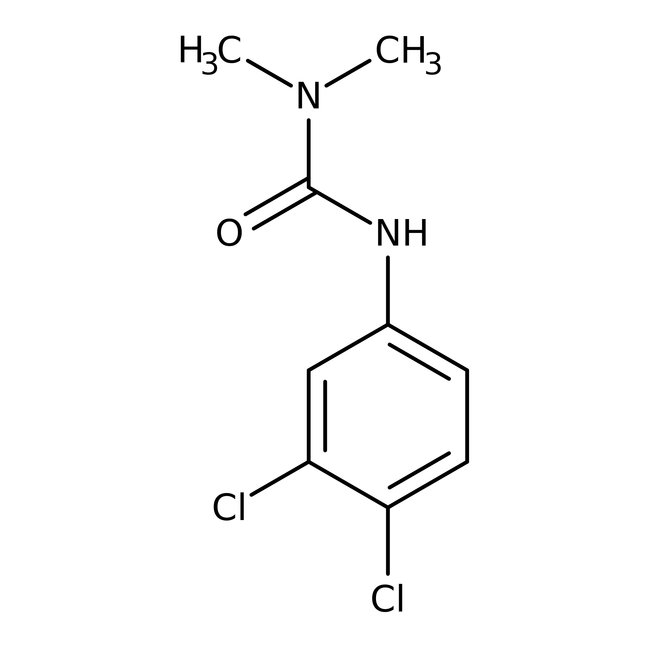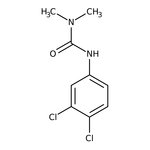Search Thermo Fisher Scientific
Thermo Scientific Chemicals
3-(3,4-Dichlorophenyl)-1,1-dimethylurea, 97%, Thermo Scientific Chemicals
CAS: 330-54-1 | C9H10Cl2N2O | 233.092 g/mol
Catalog number ALFL02986.30
View Price:Sign InSign in to see your account pricing. Need an account? Register with us today.
Quantity:
250 g
Specifications
Chemical Name or Material3-(3,4-Dichlorophenyl)-1,1-dimethylurea
CAS330-54-1
Health Hazard 1H302-H351-H373
Health Hazard 2GHS H Statement
H351-H373-H302
Suspected of causing cancer.
May cause damage to organs through prolonged or repeated exposure.
Harmful if swallowed.
H351-H373-H302
Suspected of causing cancer.
May cause damage to organs through prolonged or repeated exposure.
Harmful if swallowed.
Health Hazard 3P201-P202-P260-P264b-P270-P281-P301+P312-P308+P313-P330-P501c
View more
A phenyl urea pre-emergent agrochemical. Also an important raw material and intermediate used in organic synthesis, pharmaceuticals, dyestuff
This Thermo Scientific Chemicals brand product was originally part of the Alfa Aesar product portfolio. Some documentation and label information may refer to the legacy brand. The original Alfa Aesar product / item code or SKU reference has not changed as a part of the brand transition to Thermo Scientific Chemicals.
Applications
A phenyl urea pre-emergent agrochemical. Also an important raw material and intermediate used in organic synthesis, pharmaceuticals, dyestuff
Solubility
Soluble in water (0.049g/L), chloroform and methanol. Very slightly soluble in many organic solvents.
Notes
Store in cool. Keep container tightly closed in a dry and well-ventilated place. Store away from oxidizing agent.
A phenyl urea pre-emergent agrochemical. Also an important raw material and intermediate used in organic synthesis, pharmaceuticals, dyestuff
Solubility
Soluble in water (0.049g/L), chloroform and methanol. Very slightly soluble in many organic solvents.
Notes
Store in cool. Keep container tightly closed in a dry and well-ventilated place. Store away from oxidizing agent.
RUO – Research Use Only
General References:
- Pankaj Aggarwal; John S. Lawson; H. Dennis Tolley; Milton L. Lee. High efficiency polyethylene glycol diacrylate monoliths for reversed-phase capillary liquid chromatography of small molecules. Journal of Chromatography A., 2014,136496-106.
- Wei Li et. al. I. The role of methanol addition to water samples in reducing analyte adsorption and matrix effects in liquid chromatography-tandem mass spectrometry.. Journal of chromatography. A., 2015,138976-84.




